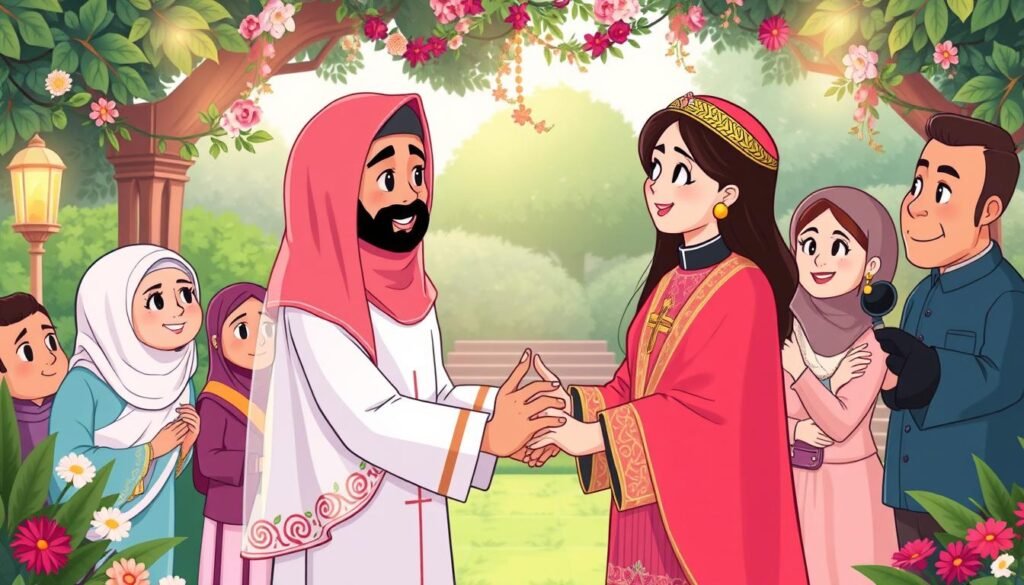What happens when a love story unfolds between two people from different faiths? Can a Muslim and a Catholic truly find common ground? This question challenges societal norms and dives into personal beliefs and cultural values.
In the United States, about 10% of Muslim women are married to non-Muslim men. This shows the ongoing reality of Muslim interfaith marriage.
Interfaith marriages, like those between Muslim Catholic couples, bring both joys and challenges. They require a thoughtful look at religious teachings and cultural contexts. As we explore the topic of Catholic marriage and its intersection with Islam, we aim to reveal the nuances behind this significant question.
By understanding theological stances, cultural attitudes, and personal narratives, we can better appreciate the evolving landscape of interfaith relationships in contemporary society.
Understanding Interfaith Marriage in Islam
The Islamic view on interfaith marriage is complex. It is based on the Quran and Hadith. A Muslim man can marry women from the “People of the Book,” like Jews and Christians, under certain conditions.
The Quran says Muslim men can marry chaste women from these faiths. This shows a more open view of interfaith marriages than with others. The key is to ensure the marriage doesn’t harm the husband’s or family’s Islamic beliefs.
Islamic teachings say to choose a spouse based on their faith, not just other qualities. While marrying a Christian or Jewish woman is okay, it’s wise to pick someone who follows Islamic principles. A non-Muslim spouse might bring concerns about disbelief, so caution is needed.
The Quran warns about the risks of marrying outside the faith. It tells Muslims to be careful about intermarriage with non-believers.
Despite the rules allowing interfaith marriages, there are big challenges. These marriages often face cultural barriers. Good communication and respect are key to making them work.
Interfaith marriage needs a strong base of love and understanding. Both partners may have different beliefs. It’s important for children to grow up with Islamic teachings to keep their faith.
Religious Perspectives on Interfaith Relationships
Globalization has changed how people from different cultures and religions connect. In many Western countries, more people are marrying someone from a different faith. This can lead to challenges, like those between Christians and Muslims.
These challenges are seen through the eyes of Catholic beliefs on marriage and Islamic teachings. This can make life harder for couples in these situations.
Muslim families often want their kids to stay within their faith. This is to keep their cultural identity strong. This view shows how religious views interfaith marriage can affect some families.
But, love and respect can help these relationships grow. Talking openly, solving problems together, and understanding each other’s beliefs are key. These actions help interfaith couples live well together.
Partnerships between Muslims and Catholics can be strong because of good communication. They focus on shared values and respect each other’s faith. This approach can make their bond stronger and deepen their faith.
As more people marry across faith lines, it’s important to understand different views. This knowledge helps couples blend their traditions successfully.
Can Muslim Marry Catholic?
Exploring faith and marriage raises interesting questions. This is true for Muslim men marrying Catholic women and Muslim women marrying non-Muslim men. The rules of interfaith marriage vary, affecting what is allowed in Islam.
Islamic Views on Muslim Men Marrying Non-Muslim Women
Islamic law allows Muslim men to marry women from the People of the Book, like Christians and Jews. This is based on the Quran and Hadith. Yet, many scholars think such marriages are makruh—discouraged.
They worry about faith compatibility and raising children. For example, questions about chastity and past experiences come up. Mawlana Ilyas Patel has said that a Catholic woman’s past does not block marriage with a Muslim man if she has remained chaste.
Islamic Views on Muslim Women Marrying Non-Muslim Men
For Muslim women, the rules are stricter. Islamic teachings usually say no to marrying non-Muslim men. This is to protect faith and ensure children are raised as Muslims.
Raising kids in a mixed-religion home is hard. It’s hard to teach Islamic values. So, while Muslim men can marry Catholic women, Muslim women marrying non-Muslim men is a big debate.
Catholic Church’s Teaching on Interfaith Marriages
The Catholic Church has clear teachings on interfaith marriages. These teachings help couples understand the Catholic interfaith marriage requirements. They focus on keeping faith alive in the family, mainly when raising children.
Requirements for Catholics Marrying Non-Catholics
Catholics marrying non-Catholics must meet certain conditions. They must promise to ensure their kids are baptized and raised as Catholic. Marriages between Catholics and other baptized Christians are seen as sacramental. But, marriages with unbaptized people are not.
Couples need to get permission from the diocesan bishop. This is called “permission to enter into a mixed marriage.” It’s a key part of Catholic marriage rules.
Raising Children in the Faith: Essential Considerations
Raising children in the Catholic faith is a big challenge in interfaith marriages. The Catholic partner must promise to raise the kids in the faith. This shows the Church’s importance on keeping religious identity.
When there are big differences in faith, raising kids can be tough. Couples need to talk openly and respect each other’s beliefs. This helps the family grow together, even with different faiths.
Legal Implications of Interfaith Marriage in the United States
Interfaith marriage laws in the United States are complex. They are shaped by state rules and federal guidelines. It’s important for interfaith couples to know their legal rights.
Marriage laws in the United States allow people to choose their partners. But, legal rules can affect these choices, like in child custody and religious rights.
In many states, interfaith marriages are treated the same as any other. But, there are differences in religious upbringing and parental rights. Interfaith couples have the right to decide their children’s education and religion.
Courts might consider the parents’ religion in custody cases. This can make things harder for interfaith families.
Interfaith couples might face challenges due to state marriage license rules. These rules might reflect religious considerations. It’s key for couples to know their rights and respect each other’s beliefs.
Cultural Factors Affecting Interfaith Marriages
Interfaith marriages are becoming more common. It’s important to understand the cultural factors at play. Family attitudes often shape these marriages.
Parents’ expectations and cultural norms can either welcome or reject these unions. This greatly affects the couple’s journey together.
Parental Attitudes and Family Dynamics
Many Muslim parents worry about their children marrying outside their faith. They fear losing their religious identity and facing social criticism. This can make family life tense.
In traditional cultures, family honor is key. This can make things even harder for interfaith couples. Knowing about these cultural factors helps us see how family approval impacts these marriages.

Challenges Faced by Interfaith Couples
Interfaith couples face special challenges, like managing religious differences every day. They need to talk openly and be sensitive to each other’s beliefs. This is important when they plan their daily lives, celebrate big events, or have kids.
Managing Religious Differences in Daily Life
Dealing with different beliefs in marriage can be tough. It might cause tension during big moments, like baptisms or holidays. Here, religious differences marriage is key. It helps couples understand and respect each other’s faiths.
Learning about each other’s faith is the first step. It builds acceptance and is vital for a healthy relationship.
Balancing Family Expectations and Personal Beliefs
It’s hard to balance family wishes and personal beliefs. Family pressures can make people question their choices or feel left out. Some in interfaith relationships worry about being rejected or losing family ties.
Interfaith Marriage Trends Among Muslims in America
Interfaith marriage trends are changing in America. They show how young people deal with love, faith, and tradition. Now, 21% of U.S. Muslims are in relationships with people from other faiths.
This is a big change from before. Modern views are making interfaith marriages more common.
Statistics on Muslim Interfaith Relationships
About 79% of U.S. Muslims in relationships stay within their faith. This shows a strong religious identity. But, 21% of them choose partners from other faiths.
This shows a new trend in America. In 2020, 75 interfaith weddings were held by Muslims for Progressive Values. This shows more people are open to these marriages.
Influences of Modernity on Traditional Beliefs
Modern views are changing how people see interfaith marriages. Young Muslims are more likely to date outside their faith. This challenges old beliefs.
Imam Imaad Sayeed’s ceremonies show this change. They mix different cultures in a natural way. Also, 34% of Americans now follow a different faith than their family.
This shows a mix of old and new views. It makes us think about how Islamic marriage rules are changing. For more on this, check out this insightful resource.
Personal Stories of Interfaith Couples
Exploring the journey of interfaith couples is a celebration of both challenges and victories. Personal stories often show the mix of love and faith. They highlight how people navigate their religious differences in relationships.
The experiences of a Muslim man married to a Catholic woman offer insights. They show the joys and complexities faced by interfaith couples. A Muslim woman in an interfaith marriage also shares her story. She talks about shared values and mutual respect.
Experiences of a Muslim Man Married to a Catholic Woman
A Muslim man shares his journey with his Catholic spouse. He stresses the importance of talking openly about faith and traditions. They celebrate both Eid and Christmas, creating a harmonious home.
The husband’s reflections show how interfaith experiences enrich family life. Their children learn about both cultures. This couple’s dedication shows that interfaith harmony is possible despite cultural differences.
Reflections from a Muslim Woman in an Interfaith Marriage
A Muslim woman talks about her journey in an interfaith marriage. She discusses balancing her traditions with her Catholic partner’s. She also talks about navigating family expectations and raising children.
She shares moments of joy in blending two faiths, like celebrating holidays together. Her insights resonate with many Muslim Catholic marriage stories. They show resilience in overcoming challenges and nurturing mutual respect.
Guidance for Interfaith Couples
Interfaith relationships need careful thought to find common ground. Couples from different religions face challenges and growth chances. Talking about beliefs and values helps build harmony and strength in the relationship.
Interfaith couples guidance helps in these talks. It ensures both partners respect and understand each other’s journey.
Finding Common Ground Between Faiths
Finding common ground faiths is key in interfaith marriages. Couples should talk about their beliefs early on. They need to know what they can’t change and what they can.
Many couples blend their traditions without converting. Celebrating each other’s festivals or rituals strengthens their bond. It shows their unity.
The Role of Open Communication in Relationships
Communication in relationships is vital for interfaith couples. They must talk about family plans, beliefs, and dreams. Sharing fears and doubts about their faith is important.
This openness prevents misunderstandings and fights. Regular talks about beliefs help build trust and teamwork. It makes their journey together richer.

Future of Interfaith Marriages
Looking ahead, interfaith marriages between Muslims and Catholics show promising changes. These changes come from growing acceptance and new views on marriage. More couples are finding ways to keep their faith while being together.
Understanding these marriages helps us see how they can grow in the future.
Societal Changes and Increased Acceptance
Modern society is becoming more open to interfaith marriages. People today value diversity and inclusivity more than before. This shift helps families and communities accept interfaith unions better.
As society changes, the old rules about marrying within your faith are fading. This lets couples focus on their love and build a life together. It also means they can have children, teaching them to respect both sides of their heritage.
The Evolution of Religious Perspectives Over Time
Marriage norms have changed a lot over time, affecting interfaith marriages. For example, some communities are slowly dropping old rules against marrying outside your faith. This change is important for families and children.
It shows that interfaith marriages can work well. But, it also points out the need for ongoing talks and learning. This helps couples and families navigate their differences and grow together.
Resources for Interfaith Couples
Being in an interfaith relationship can be tough. But, there are many resources to help. The Interchurch Families movement offers insights and tools for unity. They stress the need for love and understanding between partners.
Muslims for Progressive Values helps interfaith couples a lot. They offer counseling and connect couples with wedding officiants. They also host talks with people from different faiths, helping couples learn and talk about their differences.
Many authors and scholars have written about interfaith relationships. They share tips for a happy life together. By talking openly and planning for religious decisions early, couples can succeed in their interfaith marriage.
FAQ
Can a Muslim man marry a Catholic woman?
Are Muslim women allowed to marry non-Muslim men?
What are the requirements for a Catholic to marry a non-Catholic?
How do cultural factors influence interfaith marriages?
What are some common challenges faced by interfaith couples?
Are there statistics on Muslim interfaith marriages in America?
What resources are available for interfaith couples seeking guidance?
How can interfaith couples find common ground between their faiths?
What is the future outlook for interfaith marriages?

Embracing Faith, One Insight at a Time!
The teachings of the Quran have always guided my path. With a deep passion for Islamic knowledge, I strive to blend the wisdom of tradition with the relevance of today, making the timeless messages of Islam accessible and meaningful for everyone.
Muslim Culture Hub is my platform to share historical insights and thought-provoking articles, exploring both well-known and lesser-discussed aspects of Islamic culture and beliefs. My mission is to create an inclusive online space where everyone can learn, strengthen their faith, and connect with the profound message of Islam.
Join the journey!
May peace be upon you.








